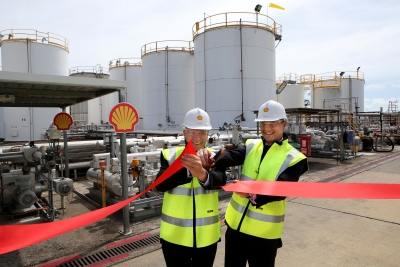
Minister Chris Hartcher (Minister for Energy and Resources) and Shell vice president Andrew Smith, Shell Diesel Bio 20 NSW launch.Shell, Rosehill.
Shell Australia has opened a new biodiesel facility at its Parramatta Terminal in western Sydney, following customer demand to reduce diesel excise liabilities and reduce the environmental impacts of fossil fuel use.
The new facility will enable Shell to sell Biodiesel 20 (B20) in New South Wales, as part of its ‘world-first’ release of the product in Australia– the product is currently available from Shell’s terminal in Melbourne.
Shell vice-president downstream Andrew Smith said the launch of B20 was responding to business needs to reduce the environmental impact of transport fuels and potential liability under the Federal Government’s carbon pricing scheme.
He said during recent discussions with commercial customers more than 50% said they would consider using B20 in their fleets for either taxation or environmental reasons.
“When we asked them if they would consider using B20 if it was available 28% they said they would because of the tax benefit,” Mr Smith said.
“Given the zero rating of biodisesel under the carbon pricing scheme, using a B20 fuel in their trucks can help affected customers significantly improve their bottom line.
“A further 36% said they would consider B20 because of the positive environmental aspects of using the fuel.”
Mr Smith said with new products, education and partnership is key to building customer acceptance.
“We were pleased when 55% or our customers who attended recent workshops held across the country said they would consider using a B20 blend in their operations,” he said.
“That number grew to 69% after they attended a session with Shell technology experts, and engine specialists from major companies like Kenworth and Cummins.”
Shell Diesel Bio20 is made up of Shell diesel with a bio component produced from vegetable oils or animal fats that meet Shell’s global sustainability standards.
Shell plans to expand its B20 availability further as it continues to work with customers to offer fuels and lubricants that help them reduce their CO2 footprint.
Shell, one of the world’s largest distributors of biofuels, believes that they are a practical commercial way to assist in reducing carbon emissions from the road transport sector over the next twenty years.





